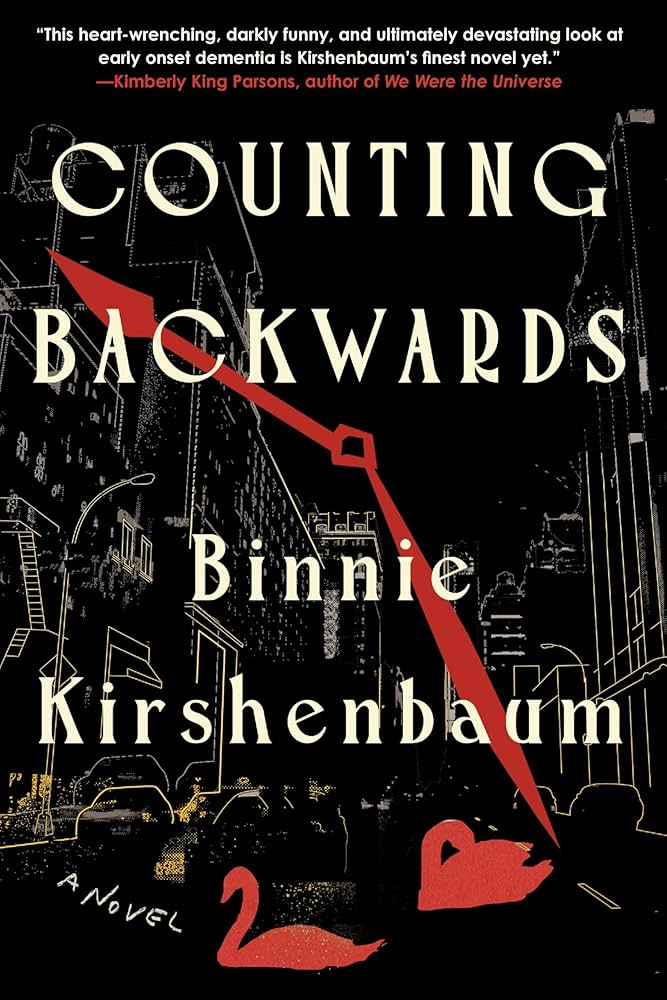Counting Backwards by Binnie Kirshenbaum
Occasionally, one has the privilege of reading a book that is so fine and perfectly expressed that you want to open it to the first page and start over. Counting Backwards by novelist Binnie Kirschenbaum is a rare work of fiction that enraptures the reader with an unlikely topic: the stages from diagnosis through progression and eventual death of a beloved family member from early-onset dementia manifested in Lewy body disease/dementia (LBD).
This starkly imaginative viewpoint is replete with dark humor that may make you laugh out loud, while some passages are tender, raw, and so heart-wrenching with profoundly sorrowful insights that they will make the reader wince and weep. Nearly everyone past childhood has been touched by the sadness and seemingly unfair randomness of dementia, which is even more disturbing when it strikes someone statistically younger than most patients. Binnie Kirshenbaum’s husband died as a result of LBD but the author is adamant Counting Backwards is a work of fiction and is not autobiographical.
A Life Rich in Love and Routine
Leo is a 53-year-old brilliant research scientist happily married to his college sweetheart, Addie, a college artist whose work is represented by Sandstone, a small Manhattan art gallery located in a converted warehouse. They own a comfortable downtown flat with an adequate studio and storage space for Addie’s work. Their lives are interesting and full of satisfying work, extensive travel, dinners and parties with friends, evenings at the theatre or concerts and occasional quiet nights reading or conversing over vegetarian meals delivered from the vast variety of ethnic neighborhood restaurants.
Their cat, Roberta, is the only carnivore in the family. Leo swoons over a rare late-night snack of cheesy scrambled eggs served on a muffin, as it has been unnecessary for either of them to learn to cook anything else. He was born and raised in Cambridge, Massachusetts, while Addie was from suburban Connecticut. New York City serves all their needs and they have made it home since college.
The Unraveling Begins
Leo’s wunderkind’s remarkable success with his research earned him a full professorship, tenure, and benefits at an early age, with a salary more than adequate to meet their needs. This led him to generously declare that Addie should focus on her creativity, her art projects, and not accept an outside job. The money she earned from shows and sales would not have paid their monthly bills. Instead, it was treated as a windfall, used for fun and frivolity; a particularly elegant dinner, a more extravagant vacation, a fine rug or other artifact for their home, as well as charitable contributions.
It took two full years with multiple visits to several specialists, including an ophthalmologist, neurologist, and psychiatrist, as well as his primary care physician, before Leo was almost incidentally diagnosed with LBD by a Mental Health Therapist Addie consulted after her husband was unwilling to undergo more tests or seek additional medical advice.
All the while, his condition was rapidly progressing. Hallucinations were the first indicator that something was awry. Looking down from their sixth-floor apartment window, Leo announced Gandhi was squatting on the pavement, stirring a pot of lentils. These disturbing yet vivid visions continued as his ability to perform everyday tasks diminished, although there were periods of lucidity. Soon, he is unable to recognize his wife of 3 decades.
When Love Meets Isolation
Work became impossible for Leo. The University was as generous as possible, combining unused vacation, sick leave, and creating a sabbatical to provide them with one year and nine weeks of full pay and benefits. None of his colleagues phoned or visited, and their social circle also abruptly disappeared, leaving Addie bereft, angered by the disloyalty, without help, and with limited financial resources. Leo’s agoraphobic sister, Denise, and nephew, Joey, provide her a needed break by bringing him into their Boston area home until a violent episode forces Addie to move him into an assisted living facility in Massachusetts. Outrageously expensive (about $17,000 per month) with indifferent care and dreadful food, it soon became clear she needed to find another facility in New York, closer and less expensive.
Ultimately, to provide the best personal care, she hires a full-time nurse’s assistant and rents them an apartment near her flat in Manhattan. Larissa is a calm, capable, unshakeable Jamaican woman with tremendous patience and infinite care who accepts Leo’s steady decline and tenderly attends to his needs, allowing Addie breathing room and the opportunity to truly focus on her artwork as the money-making career circumstances have forced it to be.
Lewy Body Disease/Dementia patients number over one million in the USA. It is linked to the presence of abnormal deposits of a protein called alpha-synuclein attached to brain cells, which affects thinking, memory, and movement.
LBD can occur in patients as young as 50. Life expectancy is 3-20 years with non-linear, somewhat unpredictable progression with various symptoms for each individual. There are seven globally recognized stages of the disease, beginning with Stage One, which has no discernible cognitive decline; not detected even by physicians. Later stages may include hallucinations, erratic behavior, anxiety, depression, restlessness, and then increased inability to dress, eat, bathe, and communicate as well as physical symptoms of muscle spasms or stiffness, difficulty sitting, standing, and walking.
Cognitive and physical decline continue until a patient is unable to communicate and is wholly dependent on a caregiver. Pneumonia is frequently the immediate cause of death.
A Gripping Portrait Told in Second Person
Binnie Kirschenbaum allows Counting Backwards to unfold in the second-person singular as Addie addresses the reader in a journalistic style, relating her thoughts, feelings, frustrations, and the sequence of events over the course of several years. The novel begins in a New York City hospital where Leo lies close to death with Addie at his side, filled with love and regrets and anguishingly conflicted with the desire that he hurry up and die.
Love, despair, humor, rage and guilt mingle through the seven chapters that mirror the seven stages of Lewy Body Disease. The past is scarcely remembered as the present is filled with agonizing pain and interspersed moments of elusive joy and beauty.
Counting Backwards is both an elegy and a eulogy, which effectively illuminates the effects of dementia on loved ones trapped with feelings of helplessness for their inability to halt it. It should be in the waiting room of memory care facilities and physicians’ offices to help provide solace.
About Binnie Kirshenbaum:
 Binnie Kirshenbaum is the author of eight novels and one short story collection. Her books have been selected as Favorite Books of the Year by The New York Times, Boston Globe, The Chicago Tribune, The San Francisco Chronicle, Newsweek Magazine, Vogue and National Public Radio. Her work has been translated into 11 languages. She is a professor of Fiction in the MFA Writing Program at Columbia University.
Binnie Kirshenbaum is the author of eight novels and one short story collection. Her books have been selected as Favorite Books of the Year by The New York Times, Boston Globe, The Chicago Tribune, The San Francisco Chronicle, Newsweek Magazine, Vogue and National Public Radio. Her work has been translated into 11 languages. She is a professor of Fiction in the MFA Writing Program at Columbia University.




